
John Winston Ono Lennon was an English singer, songwriter, musician and peace activist who achieved worldwide fame as founder, co-songwriter, co-lead vocalist and rhythm guitarist of the Beatles. Lennon's work was characterised by the rebellious nature and acerbic wit of his music, writing and drawings, on film, and in interviews. His songwriting partnership with Paul McCartney remains the most successful in history.
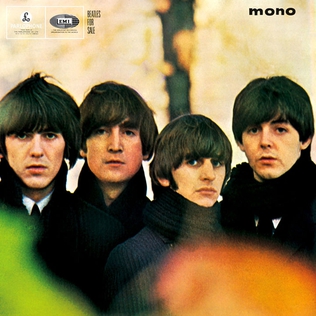
Beatles for Sale is the fourth studio album by the English rock band the Beatles. It was released on 4 December 1964 in the United Kingdom on EMI's Parlophone label. The album marked a departure from the upbeat tone that had characterised the Beatles' previous work, partly due to the band's exhaustion after a series of tours that had established them as a worldwide phenomenon in 1964. Beatles for Sale was not widely available in the US until 1987, when the Beatles' catalogue was standardised for release on CD. Instead, eight of the album's fourteen tracks appeared on Capitol Records' concurrent release, Beatles '65, issued in North America only.
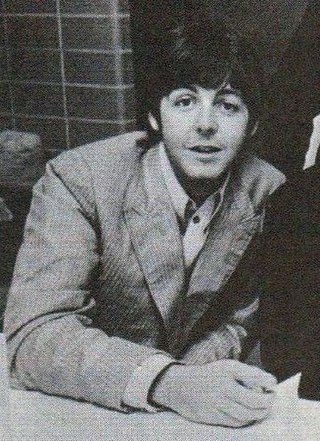
"Paul is dead" is an urban legend and conspiracy theory alleging that English musician Paul McCartney of the Beatles died in 1966 and was secretly replaced by a look-alike. The rumour began circulating in 1966, gaining broad popularity in September 1969 following reports on American college campuses.

Derek Taylor was an English journalist, writer, publicist and record producer. He is best known for his role as press officer to the Beatles, with whom he worked in 1964 and then from 1968 to 1970, and was one of several associates to earn the moniker "the Fifth Beatle". Before returning to London to head the publicity for the Beatles' Apple Corps organisation in 1968, he worked as the publicist for California-based bands such as the Byrds, the Beach Boys and the Mamas and the Papas. Taylor was known for his forward-thinking and extravagant promotional campaigns, exemplified in taglines such as "The Beatles Are Coming" and "Brian Wilson Is a Genius". He was equally dedicated to the 1967 Summer of Love ethos and helped stage that year's Monterey Pop Festival.

"Revolution" is a song by the English rock band the Beatles, written by John Lennon and credited to the Lennon–McCartney partnership. Three versions of the song were recorded and released in 1968, all during sessions for the Beatles' self-titled double album, also known as "the White Album": a slow, bluesy arrangement that would make the final cut for the LP; an abstract sound collage that originated as the latter part of "Revolution 1" and appears on the same album; and the faster, hard rock version similar to "Revolution 1", released as the B-side of "Hey Jude". Although the single version was issued first, it was recorded several weeks after "Revolution 1", as a remake specifically intended for release as a single. In addition, a promotional video for the song was shot, using the musical backing track from the hard rock version, along with live-sung lyrics that more closely resemble the "Revolution 1" version.

"Instant Karma!" is a song by English rock musician John Lennon, released as a single on Apple Records in February 1970. The lyrics focus on a concept in which the consequences of one's actions are immediate rather than borne out over a lifetime. The single was credited to "Lennon/Ono with the Plastic Ono Band", apart from in the US, where the credit was "John Ono Lennon". The song reached the top five in the British and American charts, competing with the Beatles' "Let It Be" in the US, where it became the first solo single by a member of the band to sell a million copies.
"Revolution 9" is a sound collage from the Beatles' 1968 self-titled double album. The composition, credited to Lennon–McCartney, was created primarily by John Lennon with assistance from Yoko Ono and George Harrison. Lennon said he was trying to paint a picture of a revolution using sound. The composition was influenced by the avant-garde style of Ono as well as the musique concrète works of composers such as Edgard Varèse and Karlheinz Stockhausen.

"Do You Want to Know a Secret" is a song by English rock band the Beatles from their 1963 album Please Please Me, sung by George Harrison. In the United States, it was the first top ten song to feature Harrison as a lead singer, reaching No. 2 on the Billboard chart in 1964 as a single released by Vee-Jay, VJ 587. In the UK, Billy J. Kramer released a cover of the song as his debut single, reaching No. 1 on the NME singles chart and No. 2 on the Record Retailer chart.

From 18 August 1962 to 20 September 1969, the Beatles consisted of John Lennon, Paul McCartney, George Harrison and Ringo Starr. Their break-up is attributed to numerous factors, including: the strain of the Beatlemania phenomenon, the 1967 death of manager Brian Epstein, bandmates' resentment of McCartney's perceived domineering, Lennon's heroin use and his relationship with Yoko Ono, Harrison's increasingly prolific songwriting, the floundering of Apple Corps, the Get Back project, and managerial disputes.

Magical Mystery Tour is a 1967 British made-for-television musical film directed by and starring the Beatles. It is the third film that starred the band and depicts a group of people on a coach tour who experience strange happenings caused by magicians. The premise was inspired by Ken Kesey's Furthur adventures with the Merry Pranksters and the then-popular coach trips from Liverpool to see the Blackpool Lights. Paul McCartney is credited with conceptualising and leading the project.
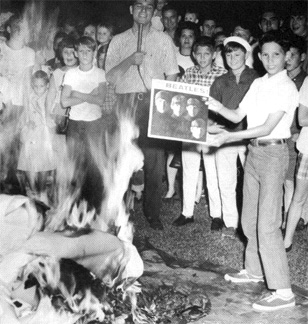
"More popular than Jesus" is part of a remark made by John Lennon of the Beatles in a March 1966 interview in which he argued that the public were more infatuated with the band than with Jesus and that Christian faith was declining to the extent that it might be outlasted by rock music. His opinions drew no controversy when originally published in the London newspaper The Evening Standard, but drew angry reactions from Christian communities when republished in the United States that July.

"Power to the People" is a song written by John Lennon, released as a single in 1971, credited to John Lennon/Plastic Ono Band. It was issued on Apple Records and in the US peaked at number 11 on the Billboard Hot 100 and number 10 on the Cashbox Top 100. It also charted at number 6 on the British singles chart. The song's first appearance on album was the 1975 compilation Shaved Fish.
The Realist was a magazine of "social-political-religious criticism and satire", intended as a hybrid of a grown-ups version of Mad and Lyle Stuart's anti-censorship monthly The Independent. Edited and published by Paul Krassner, and often regarded as a milestone in the American underground or countercultural press of the mid-20th century, it was a nationally-distributed newsstand publication as early as 1958. Publication was discontinued in 2001.
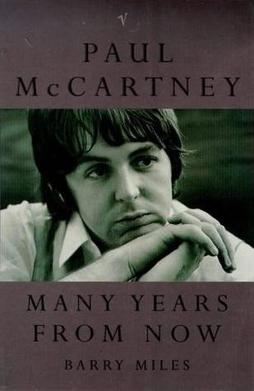
Paul McCartney: Many Years from Now is a 1997 biography of Paul McCartney by Barry Miles. It is the "official" biography of McCartney and was written "based on hundreds of hours of exclusive interviews undertaken over a period of five years", according to the back cover of the 1998 paperback edition. The title is a phrase from McCartney's song "When I'm Sixty-Four", from the Beatles' 1967 album Sgt. Pepper's Lonely Hearts Club Band. The book was first published in the United Kingdom in October 1997 by Secker & Warburg.
The Beatles were a rock group from Liverpool, England. This timeline chronicles their activities.
The International Marxist Group (IMG) was a Trotskyist group in Britain between 1968 and 1982. It was the British Section of the Fourth International. It had around 1,000 members and supporters in the late 1970s. In 1980, it had 682 members; by 1982, when it changed its name to the Socialist League, membership had fallen to 534.

Tariq Ali is a Pakistani-British political activist, writer, journalist, historian, filmmaker, and public intellectual. He is a member of the editorial committee of the New Left Review and Sin Permiso, and contributes to The Guardian, CounterPunch, and the London Review of Books. He read Philosophy, Politics, and Economics at Exeter College, Oxford.
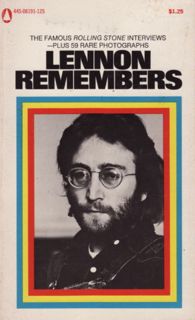
Lennon Remembers is a 1971 book by Rolling Stone magazine co-founder and editor Jann Wenner. It consists of a lengthy interview that Wenner carried out with former Beatle John Lennon in December 1970 and which was originally serialised in Rolling Stone in its issues dated 21 January and 4 February 1971. The interview was intended to promote Lennon's primal therapy-inspired album John Lennon/Plastic Ono Band and reflects the singer's emotions and mindset after undergoing an intense course of the therapy under Arthur Janov. It also serves as a rebuttal to Paul McCartney's public announcement of the Beatles' break-up, in April 1970.

The Beatles: The Authorised Biography is a book written by British author Hunter Davies and published by Heinemann in the UK in September 1968. It was written with the full cooperation of the Beatles and chronicles the band's career up until early 1968, two years before their break-up. It was the only authorised biography of the Beatles written during their career. Davies published revised editions of the book in 1978, 1982, 1985, 2002 and 2009.
7 Days was a radical socialist weekly photo newspaper published in the United Kingdom. It was in circulation from 22 October 1971 until 22 March 1972, with a final special edition in May 1972. The paper covered left-wing political events of the period including the ‘Mangrove Nine Trial’, ‘Bloody Sunday’ in Northern Ireland, industrial disputes, and the Angry Brigade campaigns. The paper also aligned itself with feminist, anti-racism, and anti-homophobia movements of the early 1970s.















